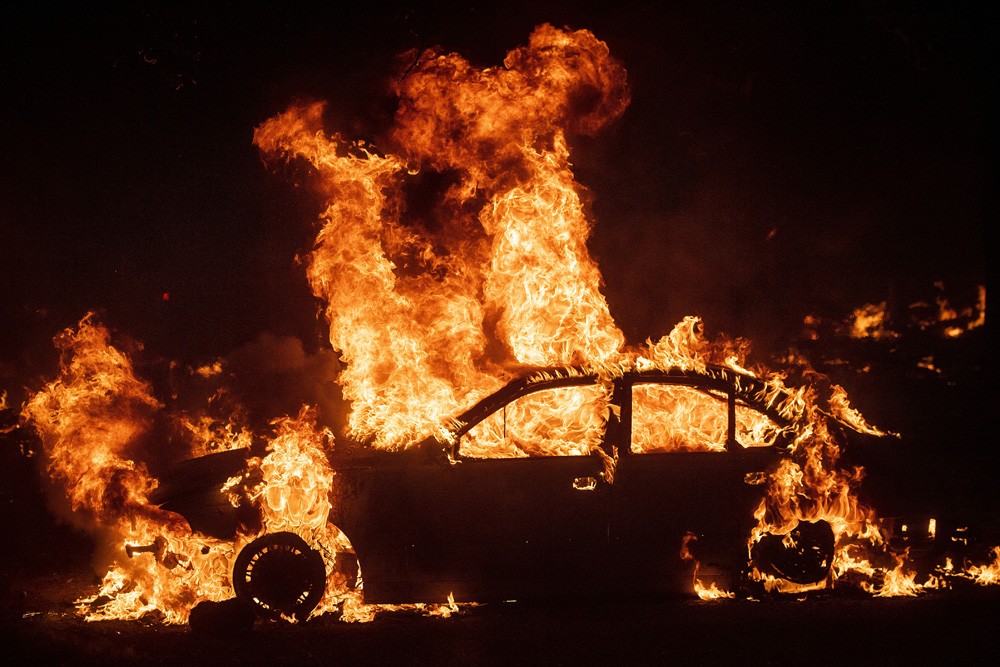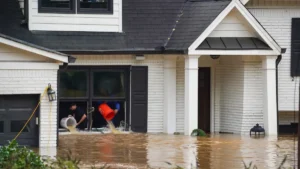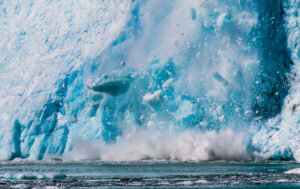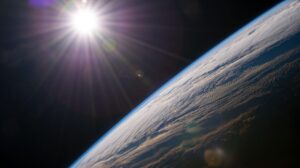Earth Nears Irreversible Tipping Points
Changes afoot now in at least nine areas could drastically alter the earth’s climate. Flames from the Kincade Fire consume a car in the Jimtown community of unincorporated Sonoma County, Calif., in October. (Noah Berger / AP)
Flames from the Kincade Fire consume a car in the Jimtown community of unincorporated Sonoma County, Calif., in October. (Noah Berger / AP)
On the eve of a global climate summit in Madrid, seven distinguished climate scientists have issued an urgent warning of approaching planetary tipping points: within a few years, they say, humankind could enter a state of potentially catastrophic climate change on a new “hothouse” Earth.
They warn that dramatic changes to planetary stability may already be happening in nine vulnerable ecosystems. As these changes happen, they could reinforce each other and at the same time amplify planetary temperature rise, commit the oceans to inexorable sea level rise of around 10 metres, and threaten the existence of human civilisations.
Their warning is issued in a commentary in the journal Nature. Their conclusions are not – and perhaps cannot be – confirmed by direct evidence or the consensus of other scientists. They present an opinion, not a set of facts that can be scrutinised and challenged or endorsed by their peers.
And the seven researchers recognise that although such changes are happening at speed, some of the consequences of those changes will follow more slowly. Their point is that the risks of irreversible change are too great not to act – and to act now.
Happening now
But the fact that they have chosen to issue such an alarm at all is a measure of the concern raised by the rapid retreat of the Arctic ice, the steady loss of the Greenland ice cap, the damage to the boreal forests, the thaw of the polar permafrost, the slowing of a great ocean current, the loss of tropical corals and the collapse of ice sheets in East and West Antarctica.
Each of these happenings – and many more – was identified more than a decade ago as a potential “tipping point”: an irreversible change that would amplify global heating and trigger a cascade of other climate changes.
“Now we see evidence that over half of them have been activated,” said Tim Lenton of the University of Exeter, UK. “The growing threat of rapid, irreversible changes means it is no longer responsible to wait and see.”
The idea of a climate tipping point – a threshold beyond which dramatic climate change would be irreversible – is an old one. Two decades ago the Intergovernmental Panel on Climate Change examined the idea and proposed that, were the planet to warm by 5°C above the long-term average for most of human history, then it could tip into a new climate regime.
But in the last few decades, carbon dioxide concentrations in the atmosphere have gone from around 280 parts per million to more than 400 ppm, and global average temperatures have risen by more than 1°C. And the rate of change, driven by profligate use of fossil fuels that deposit greenhouse gases into the atmosphere, has been alarming.
“It is not only human pressures on Earth that continue rising to unprecedented levels. It is also that, as science advances, we must admit that we have underestimated the risks of unleashing irreversible changes, where the planet self-amplifies global warming. This is what we are seeing already at 1°C global warming,” said Johan Rockström, who directs the Potsdam Institute for Climate Impact Research in Germany, and who is another signatory.
“Scientifically, this provides strong evidence for declaring a state of planetary emergency, to unleash world action that accelerates the path towards a world that can continue evolving on a stable planet.”
Inadequate pledges
In 2015, at a climate summit in Paris, 195 nations promised to contain planetary heating to “well below” 2°C, and ideally to 1.5°C, by 2100. But the Nature signatories point at that even if the pledges those nations made are implemented – a “big if”, they warn – then they will ensure only that the world is committed to at least 3°C warming.
The scientists believe there is still time to act – but their dangerous tipping points are now dangerously close.
The arguments go like this. In West Antarctica, ice may already be retreating beyond the “grounding line” where ice, ocean and bedrock meet. If so, then the rest of the West Antarctic ice sheet could collapse, and sea levels could rise by three metres.
New evidence suggests the East Antarctic ice sheet could be similarly unstable, and precipitate further sea level rise of up to four metres. Hundreds of millions are already at risk from coastal flooding.
Timescale controlled
The Greenland ice sheet is melting at an accelerating rate, and once past a critical threshold could lose enough water to raise sea levels by seven metres. Even a 1.5°C warming might condemn Greenland to irreversible melting – and on present form the world could warm by 1.5°C by 2030.
“Thus we might have already committed future generations to living with sea level rises of around 10m over thousands of years. But the timescale is still under our control,” the authors warn.
They also warn that a “staggering 99% of tropical corals” could be lost if the planet heats by even 2°C – at a profound cost to both marine sea life and human economies.
They say 17% of the Amazon rainforest has been lost since 1970: a loss of somewhere between 20% and 40% could tip the entire rainforest into a destabilised state, increasingly at risk from drought and fire.
Risks multiply
In the boreal forests of northern Asia, Europe and Canada, insect outbreaks, fire and dieback could turn some regions into sources of more carbon, rather than sinks that soak up the extra carbon dioxide.
Permafrost thaw could release ever-greater volumes of stored methane, a greenhouse gas 30 times more potent, over a century, than carbon dioxide, and so on. The dangers multiply, and each one amplifies planetary heating.
“If damaging tipping cascades can occur and a global tipping point cannot be ruled out, then this is an existential threat to civilisation,” the authors warn.
“The stability and resilience of our planet is in peril. International action – not just words – must reflect this.”
Your support is crucial…With an uncertain future and a new administration casting doubt on press freedoms, the danger is clear: The truth is at risk.
Now is the time to give. Your tax-deductible support allows us to dig deeper, delivering fearless investigative reporting and analysis that exposes what’s really happening — without compromise.
Stand with our courageous journalists. Donate today to protect a free press, uphold democracy and unearth untold stories.









You need to be a supporter to comment.
There are currently no responses to this article.
Be the first to respond.